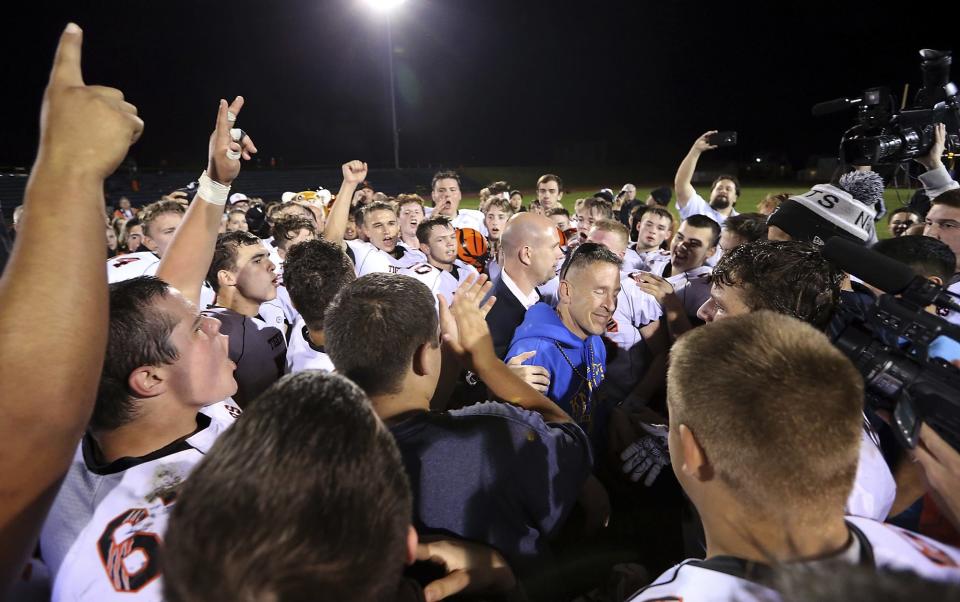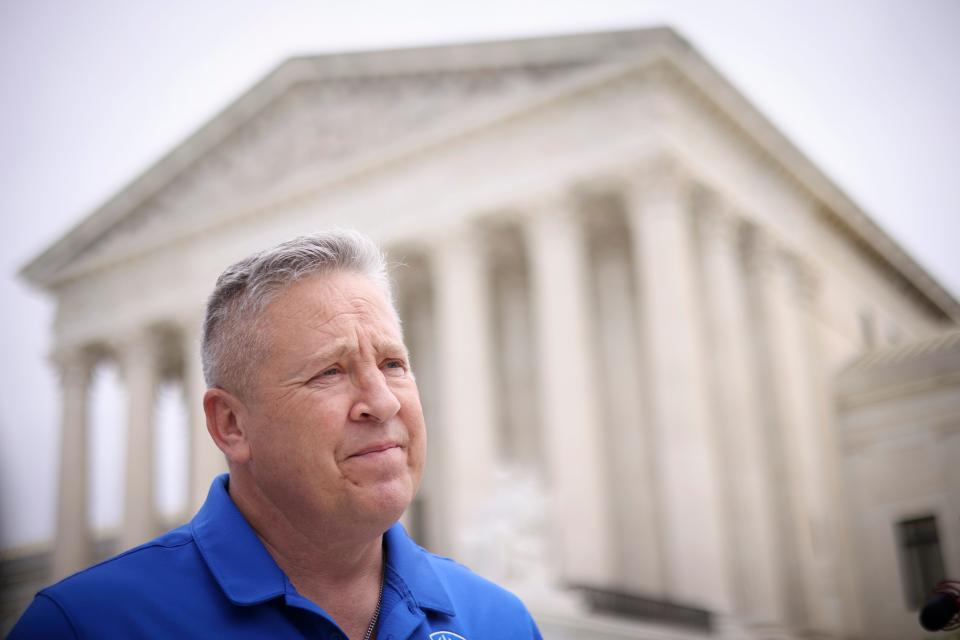Supreme Court potentially siding with praying football coach would create larger problems | Opinion
The atmosphere around youth and high school sports is already combustible.
Referees and umpires are being verbally and physically abused by coaches and parents. Coaches are subjected to harassment from overzealous parents. Kids are bullied by opponents and, sometimes, even their own teammates and coaches.
Now the Supreme Court appears poised to add religion to the mix.
The nation’s highest court could rule as early as Wednesday that the Bremerton (Washington) School District was wrong to prohibit an assistant high school football coach from praying on the field after games, further eroding the separation of church and state.
Joe Kennedy was a public school employee, yes. But if the Supreme Court rules in his favor, regardless of how narrowly tailored the opinion is, it no doubt will embolden any coach – or umpire or parent – who believes prayer belongs on the playing field.
“It’s going to exacerbate the culture wars more,” said Jennifer Rippner, who examined Kennedy vs. Bremerton with Kelly Sherrill Linkous in their paper, “The Shifting Legal Balance between Public School Employees’ Right to the Free Exercise of Religion and the Establishment Clause.”
SUPREME COURT: Conservative majority appears sympathetic to football coach

Rippner teaches education law at Indiana University. Linkous is an assistant professor in the Educational Leadership and Administration program at George Washington University.
“I hope if (the ruling) does go this way, the court provides some guidance,” Rippner added. “That they look further and see the implications of this one case.”
And make no mistake, the implications will be far-reaching.
After Kennedy continued to kneel at the 50-yard line and pray after games in defiance of orders from the Bremerton School District during the 2015 season, so many “fans, strangers and media” rushed the field that then-head coach Nathan Gillam feared for the well-being of his players, cheerleaders and band members. Gillam received "hostile and even threatening" communications and was “cursed … in a vile manner” by someone he did not recognize, and tensions ran so high that he once asked another assistant coach, who was also a police officer, whether they “could be shot from the crowd.”

“The environment around the football program,” Gillam said in a court filing, “was becoming unsafe.”
Kennedy was placed on administrative leave after repeatedly defying the directives from the school district. He did not re-apply for his position for the 2016 season -- he was on a yearly contract -- and sued the school district that fall. Gillam was so unsettled by the "negative“ and “unsafe situation” Kennedy’s actions had created that he decided to stop coaching the team.
Those concerns were not unwarranted. In April, a mother upset with a softball umpire’s calls punched the umpire in the face, leaving her with a black eye and bruising on her face. Also that month, a youth baseball umpire was taken to the hospital after being tackled by a coach.
It is not, then, a stretch to imagine someone going after a parent who objects to public prayer at their kid’s sporting event. Or somebody getting physical with the person who initiates the prayer.
And speaking of that prayer, would all be acceptable?
Kennedy is a Christian, which is probably why there is a vocal minority – likely including six justices on the Supreme Court – who think what he did was just fine. But what if Kennedy were Muslim or Buddhist or Jewish? What if he were Wiccan or a Scientologist? I’d venture to guess the same folks who are full-throated in their defense of Kennedy would be just as vocal in their outrage.
Kennedy claims he never encouraged or coerced students to join him in his prayer. But when a coach is also making up lineups and doling out minutes, it’s impossible for a player not to feel pressure – even if they might not recognize it for what it is.
What of those players who are of a different faith? Or no faith at all? Imagine the position this would put them in – especially if the rest of the team was joining in.
“If you’re in the majority, I don’t think you realize the stress that is on the minority,” Rippner said. “Unless you are there, you don’t realize that not having your viewpoint honored or respected is painful.”
Al-Farouq Aminu, who played 11 seasons in the NBA, remembers his high school teammates asking if he minded if they would pray. Aminu, who is Muslim, told them he didn’t and would often join them, skipping the phrases that conflicted with his faith.
Had they not asked, Aminu said, he might have felt differently. But looking back, he does wish they would have skipped the parts of the prayer that were at odds with his religion.
“I wasn’t old enough to speak up about it and say, 'Can we not say in a certain person’s name?’ ” Aminu said.
Aminu said he never felt pressured into joining in the prayers, nor did he think there would have been repercussions if he hadn’t.
“I was pretty good, so …” Aminu, who went on to be a first-round pick in the NBA draft, said with a laugh. “I could have been saying I don’t believe in nothing and they probably would have played me.”
But he can understand how that would be a concern.
“(When) the talent level gets to the same … it doesn’t take much to say, 'I’m going to take this person over this person,’ ” Aminu said.
Sports is one of the few common bonds we have left in this country. We might root for different teams, or prefer one sport to another, but we are united in our love for the game. And our loathing for Washington Commanders owner Daniel Snyder.
To insert religion into this sacred space on such a broad level would only create divisions. And we all would be the lesser for it.
“I don’t think in the long run that this is good for sport, or for Christianity,” the Rev. Patrick Kelly, who teaches “Sport and Spiritual Traditions” at the University of Detroit Mercy, said in an email.
“In sport, and this may be especially important for young people in the U.S. context, we encounter people from different socio-economic classes, races, cultures and religious traditions. This can help to foster the common good and can remind us that we are one human family. It’s hard to think of many things more important in our current context,” Kelly said.
“But also, Christianity itself is diminished when it is narrowly associated with one culture,” he added. “When Christianity is collapsed into one culture, this also diminishes our ability to appreciate the rich diversity of the ways it has been expressed historically and is still expressed in our world today.”
In Ecclesiastes it says there is a time for everything. Youth sports is not the time, nor the place, for public prayer.
Follow USA TODAY Sports columnist Nancy Armour on Twitter @nrarmour.
This article originally appeared on USA TODAY: Supreme Court siding with praying coach would create larger problems

